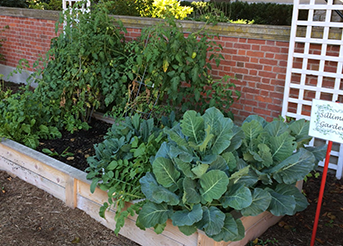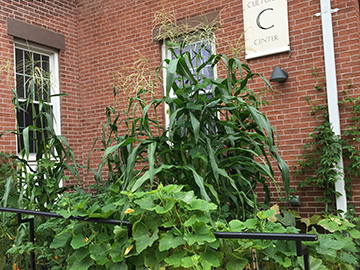
Yale University is a leader in sustainable practices on campus and the grounds maintenance teams who care for the lawns, trees, and gardens on Yale’s campus are no exception. Joe Signore, who supervises landscaping and grounds for the downtown area of central campus, leads the way with creative and innovative ideas for reconnecting students with the land while reducing the environmental impact of Yale’s landscapes. Recent installations include new edible plant and pollinator gardens on campus.
Signore stresses that aesthetics doesn’t necessarily preclude other important elements of landscaping. For example, gardens near living spaces can have some edible plants and flowers, such as blueberry bushes or tomato vines. They provide enjoyment and nutrition for people living near them, while being pruned in such a way that they are also visually appealing. Caring for these gardens using organic growing techniques ensures that the fruits and vegetables produced in the gardens are safe to eat and better for the environment.
Signore is building on successes at the Yale Divinity Farm and Yale’s cultural centers. At La Casa Cultural, a team of grounds staff and students joined forces to plant a small garden that uses rainwater runoff from the roof for irrigation. At the Native American Cultural Center, a garden near the entrance contains corn and squash plants and the members of the Cultural Center have taken an active role in caring for the garden. 
“The gardens installed at La Casa and the Native American Cultural Center are a glimpse into what can be accomplished with coordination, teamwork and a shared passion,” said Signore. “Under the guidance of Master Gardener Joe Sciarini and Assistant Director (of the Native American Cultural Center) Kapi’olani Laronal, students and grounds team members were major assets in making the edible garden a success.”
The popularity has since spread, and those early successes have inspired Signore’s landscape designs in his response to interest from the undergraduate residential colleges. Silliman College was the first to embrace the idea, and a wellness garden was installed last spring. Berkeley, Ezra Stiles, and Saybrook colleges will be next, and Signore hopes that the excitement surrounding the gardens will continue to spread to the remaining colleges.
As the movement towards wellness gardens and edible plants gathers momentum, Signore is also looking to plant more pollinator gardens, which attract honey bees, butterflies, and other critical species. This would support landscaping efforts in the Science Hill area of campus to promote biodiversity through the establishment of urban meadows and demonstrate Yale’s efforts to be a leader in sustainable landscaping practices.
Yale is committed to building a more sustainable world. By doing what we do best—integrating science, the humanities, and our community—Yale creates, tests, and adopts innovative solutions to the environmental and social challenges we all face.